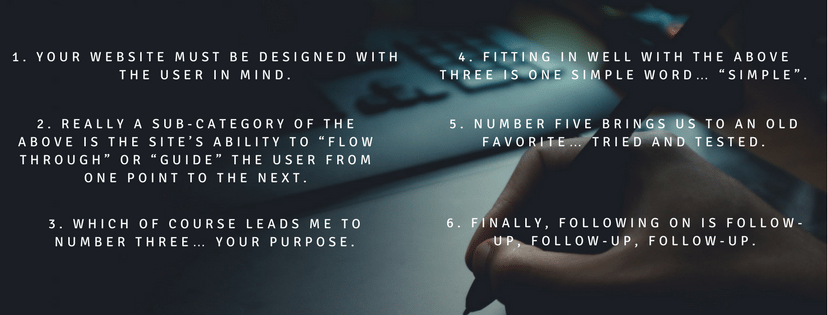
12 Mar 6 Key Strategies For A Successful Website
There are many things that come together when building a website, but amongst all the hype, colour and bells and whistles, there are six essential elements that absolutely MUST be followed when deciding on the structure of your online business.
1. Your website must be designed with the user in mind.
Now I know this sounds obvious, but when I say “user” I don’t mean you. And I don’t mean your staff or your friends. Chance are they all have a similar skill level as you do when it comes to web based practices and surfing skills. When you design your website you must design it with the same mindset that a reporter would write his or her articles for the local rag – it must be simple enough that a 12 year old can understand it, use it, and navigate it. The only exceptions to this rule are if the 12 year olds that you know are super tech-savvy, or if your client base is super-tech savy.
2. Really a sub-category of the above is the site’s ability to “flow through” or “guide” the user from one point to the next.
Tell me, do you know where it is that you want your customers to go on your website, or are you planning to let them figure it out all by themselves? Let me put to you this way… do want them to “buy” something from you or just ‘take a look around’? By making it not only easy, but ‘enticing’, you can guide your website visitors from one page to the next and gently lead them to your purpose.
3. Which of course leads me to number three… your purpose.
Does your website look like it *has* a purpose, or does it just look like it’s come together over the last few years a click here and a click there? Yes, it’s good to have a website that has content, but as that content has been added over the years, have youupdated your design to make allowances for it, or just plopped it down anywhere available? If you’ve got no real sense of purpose for your website then your customers sure won’t feel any ‘sense of purpose’ either. No purpose, no purchase.
4. Fitting in well with the above three is one simple word… “simple”.
Yes, you’ve heard this one before, “Keep it Simple Silly”. It’s an age old mantra in the business world. So not only must your website *be* simple, which we’ve already covered, it must also *look* simple. Try to avoid the clutter, especially on the main page. Just because you have the option to plug-in some specific feature doesn’t mean that you have to. Keep it simple and keep it clean.
5. Number five brings us to an old favorite… Tried and Tested.
While yes, it’s true that many of us enjoy the “new things” in life, this should not so much apply to our websites. The bells and whistles I mean. Sure, the content must be new; it must be fresh and renewed weekly; and even the engines that power your website, the technologies. But there’s one area of your website that you should no e so quick to make change to… and that’s the sales process. Unless you find that there’s been a major shift in people’s psyche these past years, remember that people are still people. They are motivated by wants and needs and desires. The tried and true buying signals that applied to perfect customer last year, still apply now, and will apply next year also.
6. Finally, following on is follow-up, follow-up, follow-up.
This is the most tried and test sales strategy available. So much so that it warrants a category on its own; in fact, books have been written on the subject. Too often in the small business sector we see business owners trying to emulate big business, forgetting all the while that big business had big budget and buku customer base. You want to get there? Fine, then follow up with your customers, prospects and never let them go buy your product anywhere else – full stop! That’s the key to a successful business.
– Paul Barrs



